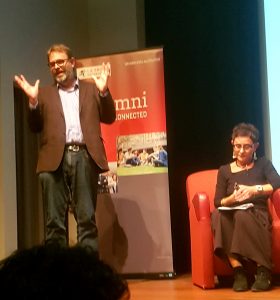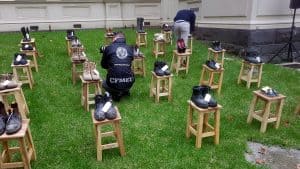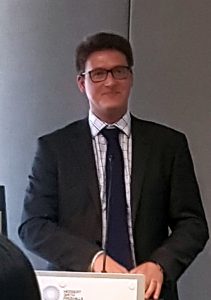 It’s soon to be the tenth anniversary of the iPhone. Tech writers are preparing their articles based on comparisons of how the iPhone has changed and how it has changed the world. But there has always been a dark side to the production of the iPhone and modern technologies, as a whole.
It’s soon to be the tenth anniversary of the iPhone. Tech writers are preparing their articles based on comparisons of how the iPhone has changed and how it has changed the world. But there has always been a dark side to the production of the iPhone and modern technologies, as a whole.
Category: stress
Important research into domestic violence strengthens OHS context
 It is useful to consider corporate wellness and mental wellbeing programs in the context of work-related suicides. By considering what many consider a worst-case scenario, the effectiveness of these programs can be tested. The increased attention on domestic violence and its relationship to work over the last few years in Australia can play a similar role. New research on “intimate partner violence” provides mental health scenarios for which safety professionals need to be prepared. Continue reading “Important research into domestic violence strengthens OHS context”
It is useful to consider corporate wellness and mental wellbeing programs in the context of work-related suicides. By considering what many consider a worst-case scenario, the effectiveness of these programs can be tested. The increased attention on domestic violence and its relationship to work over the last few years in Australia can play a similar role. New research on “intimate partner violence” provides mental health scenarios for which safety professionals need to be prepared. Continue reading “Important research into domestic violence strengthens OHS context”
Workplace mindfulness? The jury is still out
 At a well-attended La Trobe University alumni seminar in May 2017, researchers discussed the reality and the hype surrounding mindfulness. They explained the varieties of mindfulness, the clinic research history over the last four decades and the personal advantages of living mindfully. However in the workplace and organisational context, they said that there was insufficient evidence to show benefits from workplace mindfulness in this “emerging area of research”.
At a well-attended La Trobe University alumni seminar in May 2017, researchers discussed the reality and the hype surrounding mindfulness. They explained the varieties of mindfulness, the clinic research history over the last four decades and the personal advantages of living mindfully. However in the workplace and organisational context, they said that there was insufficient evidence to show benefits from workplace mindfulness in this “emerging area of research”.
The seminar was hosted by Latrobe University with three speakers
- Dr Jennifer Arnold-Levy, Director of Making Emotions Work
- Josh Marsden, Manager, Health and Wellbeing La Trobe University and
- Dr Eric Morris, Director of Psychology Clinic, La Trobe University (pictured above.
Many mindfulness advocates have developed programs that they claim can offer substantial benefits to workplaces by increasing productivity and reducing injury and illness, primarily, by changing the behaviours and attitudes of employees. This individual approach is often dropped into a workplace and promoted as an organisational opportunity. But the La Trobe researchers mentioned that this is a very recent perspective.
Trade unions offer alternative, more accurate(?) workplace death statistics
 The Victorian Trades Hall Council (VTHC) indirectly acknowledged the ILO theme for World Day for Safety and Health at Work in its media release for International Workers Memorial Day 2017. The ILO was calling for more, and better, data on workplace injuries and illnesses. VTHC questioned the official workplace fatality numbers issued by the government. It stated:
The Victorian Trades Hall Council (VTHC) indirectly acknowledged the ILO theme for World Day for Safety and Health at Work in its media release for International Workers Memorial Day 2017. The ILO was calling for more, and better, data on workplace injuries and illnesses. VTHC questioned the official workplace fatality numbers issued by the government. It stated:
“A VTHC analysis shows that in 2016-17 over 200 Victorians died as a direct result of Workplace injury or illness, although the government’s official tally for the year is just 26.”
This disparity needs to be discussed across jurisdictions because occupational health and safety (OHS) data has always been incomplete, a fact acknowledged by many government inquiries in Australia for many years.
OHS changes to come in wake of the Western Australia election result
 It is rare to find an occupational health and safety (OHS) seminar that is captivating but there is almost always some useful bits of safety information, hopefully enough to make attendance worthwhile.
It is rare to find an occupational health and safety (OHS) seminar that is captivating but there is almost always some useful bits of safety information, hopefully enough to make attendance worthwhile.
On March 24, 2017 the Safety Institute of Australia and Herbert Smith Freehills (HSF) held the annual breakfast seminar in Melbourne. Speakers included representatives from the HSF law firm, the SIA, WorkSafe Victoria and SafeSearch. Perhaps of most interest was HSF’s senior associate from Perth, Sam Witton (pictured), who outlined the OHS changes likely in Western Australia now the Australian Labor Party (ALP) is in power.
When Work Kills – new research on workplace suicides
 There are many advocates of the importance of a mental health and wellbeing in workplaces. But few of them address the worst-case scenario for workplace mental health of work-related suicides. In some cases, the mental health advocates are overly cautious about even speaking the reality, which does not help reduce mental health stigma.
There are many advocates of the importance of a mental health and wellbeing in workplaces. But few of them address the worst-case scenario for workplace mental health of work-related suicides. In some cases, the mental health advocates are overly cautious about even speaking the reality, which does not help reduce mental health stigma.
In 2016 Professor Stewart Clegg, of UTS Business School said that
“That work can kill the will to live is a fundamental ethical problem that we must attend to…”
New research from the UK provides a useful summary of the work-related and workplace suicides in Europe with important lessons of where precarious employment and the “gig economy” could lead.
OHS and Maryam Omari
Maryam Omari is an Associate Professor at Edith Cowan University and Dean of its School of Business and Law. She has worked in the Middle East, UK and USA and SafetyAtWorkBlog had a chance to ask her some workplace safety questions. Professor Omari has published several books with her latest being “Workplace Abuse, Incivility and Bullying: Methodological…
